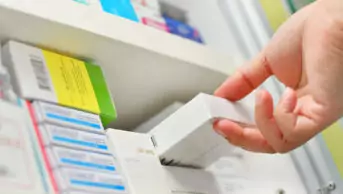
Chris McAndrew / Wikimedia Commons
The UK government is considering whether licensed wholesalers could hold reserve stocks of medical cannabis to reduce delays in patients receiving their medicines.
Jo Churchill, pharmacy minister, said in a parliamentary written answer published on 4 February 2020, that the government was “aware that some wholesalers and pharmacies have reported challenges in importing a range of unlicensed [cannabis-based medical products]”.
She said the Department of Health and Social care, the Medicines and Healthcare products Regulatory Agency (MHRA), the Home Office, NHS England and NHS Improvement were now discussing ways to mitigate such delays, which could include “exploring mechanisms to allow licensed wholesalers to hold a small reserve stock”.
Currently, medical cannabis cannot be imported in bulk to be held as reserve stock — only the amounts that are required for specific prescriptions can be imported.
A spokesperson for the MHRA confirmed to The Pharmaceutical Journal that discussions around the supply of medical cannabis were taking place.
“It is clear that for some products, long lead times and delays in receiving export licenses from the authorities in the country of manufacture have led to delays in the supply against first prescriptions and continuity of supply for repeat prescriptions,” they said.
“Meanwhile, where import applicants are providing the correct documentation, the MHRA advises that they treat these as emergency imports — applicants can usually expect decisions from the UK authorities within two working days”.
Mike Barnes, consultant neurologist and chair of the Medical Cannabis Clinicians’ Society, said he was “glad there is some movement on this issue”.
“The delays in supply are ridiculous; an average of four to six weeks from prescription to medicine to patient.
“If we have the ability to get bulk into the country, then the supply time would be just a day or so and, more importantly, the cost would drop”.
Andy Yates, pharmacy lead for the Centre for Medicinal Cannabis (CMC), told The Pharmaceutical Journal that the CMC is engaging with the above bodies on the issue. “These departments recognise that there is a problem, and they are working to a solution — but we haven’t see what that solution looks like”, Yates said.
Yates added that tetrahydrocannabinol-containing products are Schedule 1 products, which only become Schedule 2 when a prescription for medical cannabis is written, meaning that they cannot be held in stock until a prescription is submitted.
“We have proposed that a Schedule 1 licence could be held by wholesalers and specials importers wishing to import [medical] cannabis, as an interim solution to allow them to hold stock until other measures are allowed.”
Figures shared by Churchill on 23 January 2020 showed that between January 2019 and October 2019, inclusive, 16 NHS prescriptions for unlicensed medical cannabis products had been prescribed and dispensed in the community. In a parliamentary written response on 30 January 2020, Churchill also said that in October 2019 alone there had been 33 private prescriptions issued.
You may also be interested in

Government advises chief pharmacists to coordinate aid between trusts amid radioisotope shortage

Mandatory ‘eight-week buffer stock’ requirement not met by medicine suppliers, reveals audit
